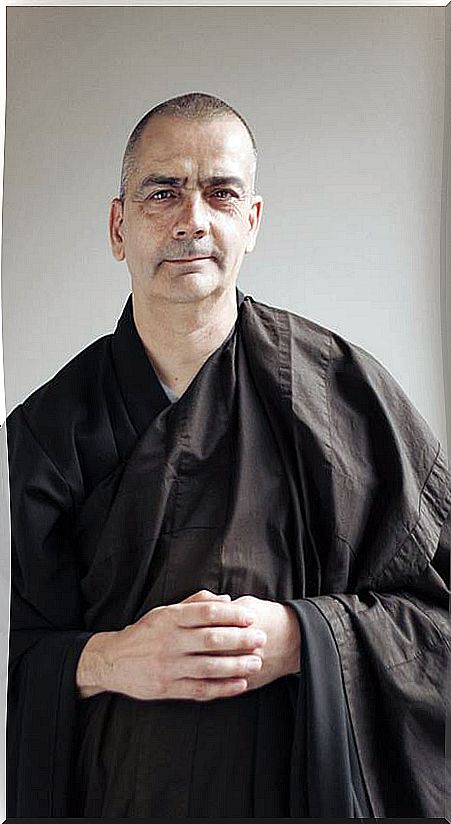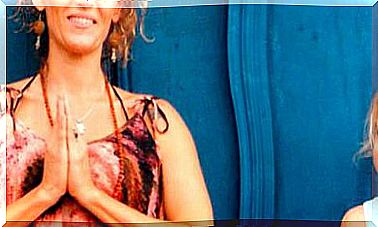“Meditation Is The Door To True Happiness”
We interview Lluís Nansen, he speaks with the authority of someone who has been meditating for 25 years. According to Zen, altruism is the key to staying consistent.

In the teacher Lluís Nansen Salas, two aspects are brought together that are often considered – perhaps due to ignorance – antagonistic: science and spirituality. There is actually no contradiction between Theoretical Physics and the practice of Zen Buddhism.
From the Zen Barcelona Kannon Dojo, in the center of the Catalan capital, Nansen bases his teaching on the rigorous practice of zazen, sitting Zen meditation, and its harmonization with everyday life.
The “awakening” through the practice of zazen
—In spiritual practice it is often spoken of “awakening” or “liberation”, what do these concepts refer to?
—With the practice of zazen, a dynamic is created with the body that changes the way we function mentally.
It frees us from habits and conditioning, which always leave us unsatisfied and make us suffer. These conditionings affect our perception of reality, as happens when an intense emotion is present, it produces a distorted vision, an illusion, a dream.
That is why we talk about waking up and seeing things as they are. Seeing things as they are means seeing them knowing their true nature, which is insubstantial and impermanent. This is what frees us from suffering.
—In Zen practice there is often talk of practicing without a goal but at the same time it seems that the goal is “awakening”. Can you explain this paradox to us?
“When we talk about practicing without aim, we mean cultivating an attitude without the intention of getting anything personal.”
When the slightest intention to obtain something is present in us, our mind is working in the ordinary and dualistic way, and precisely this way of functioning is one of those conditioning that we talked about before.
Only when we practice with an attitude without intention of getting anything personal can our mind enter the non-dualistic way of functioning and become aware of oneness with the universe. But we must not be confused, that does not mean that we have to do things without sense, or that we cannot aspire to awaken with all beings.
When we do things with an altruistic motivation there is no obstacle to awakening.
Why do you think it takes so long to cultivate a habit that we know will improve our relationships and quality of life?
—What makes it difficult for us to cultivate meditation, even though we know that it will benefit us, is the fact of believing that we can achieve happiness by pursuing illusions, even though we find that they always lead to dissatisfaction.
While we believe in illusions, we go from one illusion to another, and we never have time for meditation, which is the door to true happiness.
—What are some of the difficulties that you have personally encountered in maintaining a disciplined practice for more than 25 years and how have you overcome them?
“The difficulties I have encountered are the same as those of other people: the illusions of the ego.”
And at some point I may have doubted my ability to overcome them, but I have never doubted the practice of zazen.
“What helped you to be so faithful to the practice?”
—On the one hand, the realization of the emptiness of my illusions and, on the other, the aspiration to share this practice with others, learn from my teacher and my companions, and dedicate my energies to facilitate the practice of other people.
The latter has become an unlimited source of energy.
“Do you have any tips that might be helpful?”
—Anyone who wants to cultivate a constant and lasting practice must go beyond a personal interest and share that spiritual practice with others, because by sharing it he will find unlimited motivation that will make him overcome all obstacles and go even beyond himself.
“Zen practice is ritualized.” Why are rituals so important in practice? How can a ritual liberate us if it seems rigid?
—The bodily gestures of the ritual have an influence on the mind.
They are a dialogue between the body and the mind, and help us to get out of the mind-mind loops, which are self-generating suffering. There are many prejudices about rituals, but the main resistance is the egotic conditioning factors, which precisely the ritual helps us to dispel.
Before rejecting the ritual we should try it and see what influence it has on our mind.
Lluís Nansen Salas (Barcelona, 1965), Zen master, has a degree in Theoretical Physics from the Autonomous University of Barcelona.
He began the practice of Zen in 1991. In 1995 he was ordained a monk in the line of the Japanese master Taisen Deshimaru and Roland Yuno Rech, from whom he received the transmission – the shiho – of the dharma in December 2016.
His scientific training, as well as his confidence in the experience of each one, allow him to teach the dharma from objectivity and empiricism, something easy to understand for Western practitioners.
From Dojo Zen Barcelona Kannon (www.zenkannon.org) he teaches courses on Zen mindfulness and Buddhist philosophy. He also conducts sesshin zen retreats.
He is the author of the book Zen Meditation, the art of simply being (Ed. Viena, Barcelona, 2017).









